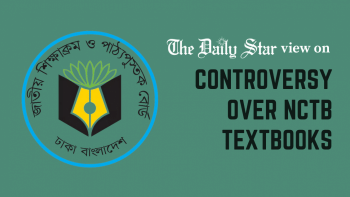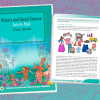The textbook debate: Managing the politics

The raging controversy about the new textbooks, though so far only their trial editions have been published for Classes 1, 6 and 7, have brought politics to the forefront and sidelined the necessary debate about pedagogic validity of the textbooks – i.e. if and how these can be used in the classroom to help students acquire the intended knowledge and skills.
Three kinds of debate have arisen about the textbooks: a) the handling of content regarding the matters of religious beliefs and views about history and culture – those who aim to create an Islamic state and build a Shariah-based society are most vocal in this respect; b) complaints about factual errors, printing mistakes and inconsistencies in the content; and c) the capability and preparation of teachers and the conditions in the classroom that would allow implementing the anticipated pedagogy and student evaluation. There is no point in framing an ideal curriculum and writing ambitious textbooks if these cannot be put to good use in the classroom.
Errors can creep into new textbooks; the process of preparing, selecting, reviewing and vetting the content must prevent these errors, and there should be a process of correcting inadvertent errors that still may arise. The type and quantity of mistakes and inconsistencies reported in the media suggest that the process has not worked well.
Curriculum and textbook renewal is not and should not be something that has to start from scratch. A system already exists. There are legitimate and much discussed concerns about how our schools are performing and what students really learn. Do these problems arise out of the curriculum and textbooks in use? And would the problems be solved by rewriting the curriculum and textbooks? Hardly likely.
A more reasonable argument, offered by thoughtful educators and supported by practical experience and research evidence, is the large gap between the curriculum, the syllabus and their objectives, and what happens in the classroom. The skills, capability and motivation of teachers; the learning environment in school and classrooms; the approach in assessing students' learning outcome, and the management and accountability of schools and teachers – all these combine to create the gap between intentions and reality. Will the new curriculum and textbooks not face these challenges?
The weaknesses in our system beyond the content of the new curriculum and textbooks are indeed the challenges. The extent to which these are overcome will determine how successfully the objectives of the curriculum and the textbooks will be achieved. The pandemic impacts have aggravated the pre-existing problems in the system. Concerned educators have expressed the view that paying attention to recovering the pandemic-induced losses and going slow on introducing curriculum renewal would have better prepared the system for curricular reform. In fact, many would argue that bringing about many changes without addressing the obstacles to implementing the curriculum, old or new, would land us in greater trouble.
The legitimate and important issues about the systemic challenges, and considering these in the content, sequence and articulation in the syllabus and the textbooks – and preparing teachers and schools to put them in use – have been pushed aside by the faith and ideology-induced debate about the new curriculum and textbooks.
The historical context of the current debate cannot be forgotten. The constitution adopted democracy, nationalism, socialism and secularism as the fundamental principles of the state. The declaration of independence proclaimed the goal of building a society that upholds justice and human dignity. But the declaration of independence lives only in rhetoric; the constitution has been dismembered so many times that the fundamental state principles have lost their significance. Although the generic concepts embodied in the four principles have to be interpreted and explained so they can be reflected in the state's business in the contemporary context, politicians of all stripes – pursuing their narrow and partisan interests – have rendered them meaningless.
How the four pillars of the state find expression in the education system was considered in the report of the Qudrat-e-Khuda Education Commission. It was sent to the archive in 1975. The National Education Policy, 2010 was a compromise that gave legitimacy to the three-way division of school education: mainstream vernacular education, two kinds of madrasas , and the English-medium schools. The draft of the 2010 policy had mentioned the aim of a secular education (respecting and recognising the significance of all religions). The final version eliminated the mention of secular education.
It cannot be forgotten that there is a section of Bangladeshi population that has never accepted the words and the spirit of the declaration of independence and the four pillars of the constitution. They reject or provide their own self-serving interpretation of these principles.
Politics is an art of compromise. But a line also must be drawn. What form can the compromise take with those who want the state to intervene in the personal and spiritual relationship between the individual and the creator; who want the state to declare who is a Muslim and who is an infidel, who want the state to enact a blasphemy law with death penalty? Their aim is to create a theocratic state – a radical departure from our spirit of liberation.
The followers of faith-based ideology for the state continue to take advantage of populist sentiments. A Khelafat Majlish demonstration in front of Baitul Mukarram declared the new curriculum to be a means of propagating Hindutva; that it undermines contribution of the Muslim rulers of Bengal; that the lesson about Darwin's theory of evolution insults religious beliefs of Muslims and so on. Other religious groups have expressed similar views and have taken to the street to voice their demand for withdrawing the curriculum and the textbooks, and for punishing those who prepared them.
What should be the government response? The only way to navigate the difficult terrain is to uphold democratic culture and practice, and have faith in people's judgement. There are two important steps at this juncture: 1) a solution has to be found to make the upcoming parliamentary polls acceptable to the people, neutral observers and the opposition parties; and 2) the ruling party must demonstrate its confidence in people's verdict by forgoing nomination trade, selecting honest and locally popular candidates, and putting a leash on its mastan cadres. They also need to moderate their triumphal narrative of achievements, admit problems and sufferings people face, and indicate how these issues would be addressed.
The way to fight the backward-looking forces and false populism is to have democratic trust in and genuine respect for common people.
Dr Manzoor Ahmed is professor emeritus at Brac University, chair of Bangladesh ECD Network (BEN), and vice-chair of Campaign for Popular Education (CAMPE).

 For all latest news, follow The Daily Star's Google News channel.
For all latest news, follow The Daily Star's Google News channel. 











Comments